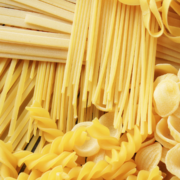Pasta, the Poor and Giving
As originally appeared in The Jerusalem Post on February 3, 2022.
“Life is too short, and I’m Italian. I’d much rather eat pasta and drink wine than be a size 0.” Sophia Bush
Finally waking up to what has been going on in the world for the last three or four months, Israelis took to social media to protest rising prices in general and Osem pasta, in particular.
Joined by a willing traditional media to help fan the flames, the “pasta protesters” chalked up a short-term victory as Osem announced it would not be raising its prices in the next few months.
We heard hypocritical politicians pile on private companies, complaining that they “are making too much money,” all the while trying to justify why government price-controlled products also saw substantial cost rises. With little in the way of competition and increased prices at all parts of production, don’t be surprised if higher inflation is with us for some time.
What this means for people at or near the poverty line is that they will have a very hard time buying the basics they need to subsist.
I am reminded of something I have written here before. A few years ago, before Pessah, I was given money by a foreign donor to distribute to the poor to buy holiday necessities. I went to my local fruit and vegetable store and asked if they have poor customers that I could distribute money to in the form of fruit and vegetables. The store owner said he had some people who could use the help. He then added, “Do me a favor and don’t just remember the poor before Pessah and Rosh Hashana. There are another 50 weeks of the year that they need to eat, and no one cares about them.”
This week’s Torah portion is Terumah. The late Rabbi Jonathan Sacks discussed how we can build a house for God? After all, the Lord is bigger than anything we can imagine, let alone build. After developing his thesis that it’s all about God getting closer to us via the sanctuary he wrote, “That is how God came to be close to the Israelites through the building of the sanctuary. It wasn’t the quality of the wood and metals and drapes.
It wasn’t the glitter of jewels on the breastplate of the High Priest. It wasn’t the beauty of the architecture or the smell of the sacrifices. It was the fact that it was built out of the gifts of “everyone whose heart prompts them to give” (Ex. 25:2).
Where people give voluntarily to one another and to holy causes is where the Divine Presence rests. Hence the special word that gives its name to this week’s parasha: Terumah. I’ve translated it as “a contribution” but it actually has a subtly different meaning for which there is no simple English equivalent. It means “something you lift up” by dedicating it to a sacred cause. You lift it up and in turn, it lifts you up.
The best way of scaling the spiritual heights is simply to give in gratitude for the fact that you have been given. God doesn’t live in a house of stone. He lives in the hearts of those who give.”
As we know, it’s not so simple to part with our money. Imagine what the response of those who just came out of Egypt was, with newfound riches after being slaves with nothing, being asked to donate some of their money. I once heard from a fundraiser that the biggest problem in fundraising isn’t that donors don’t have deep enough pockets, it’s that they have short arms.
On the Torah portion, Terumah Rabbi Yissocher Frand writes, “This is an apocryphal story, but the story goes that Stalin, the ruthless dictator of the Soviet Union, was trying to inculcate his comrades into the concepts of communism – everyone needs to share. He would ask them “If you had two cows, what would you do with the two cows?” They had to say “I would take one for myself and give one to Comrade Stalin.”
“If you had two houses, what would you do with them?” “One for myself and one for Comrade Stalin.”
“If you had two cars, what would you do with them?” “One for myself and one for Comrade Stalin.”
“And if you had two planes…?” “One for myself and one for Comrade Stalin.”
Finally, he asked, “And if you had two chickens what would you do?” The response was “I would keep both chickens.” Stalin asked, “You were willing to give me the cows, the houses, the cars, and the planes, but not the chicken. Why is that?”
The comrade answered: “True. Because I don’t have a cow, a house, a car, or a plane, but I do have two chickens.”
If you have the two chickens, you don’t want to part with the two chickens because you have it, and once you have it you can’t part with it.”
I often encourage people when making a budget to add a line item, charity. This way they are always putting money on the side in order to give. Let’s learn the lesson of Terumah. Don’t wait another two months for Pessah to start giving. Now, during this inflationary period, is the time.
The information contained in this article reflects the opinion of the author and not necessarily the opinion of Portfolio Resources Group, Inc. or its affiliates.
Aaron Katsman is the author of Retirement GPS: How to Navigate Your Way to A Secure Financial Future with Global Investing (McGraw-Hill), and is a licensed financial professional both in the United States and Israel, and helps people who open investment accounts in the United States. Securities are offered through Portfolio Resources Group, Inc. (www.prginc.net). Member FINRA, SIPC, MSRB, SIFMA, FSI. For more information, call (02) 624-0995 visit www.aaronkatsman.com or email aaron@lighthousecapital.co.il.




